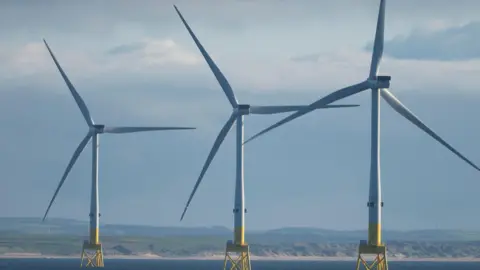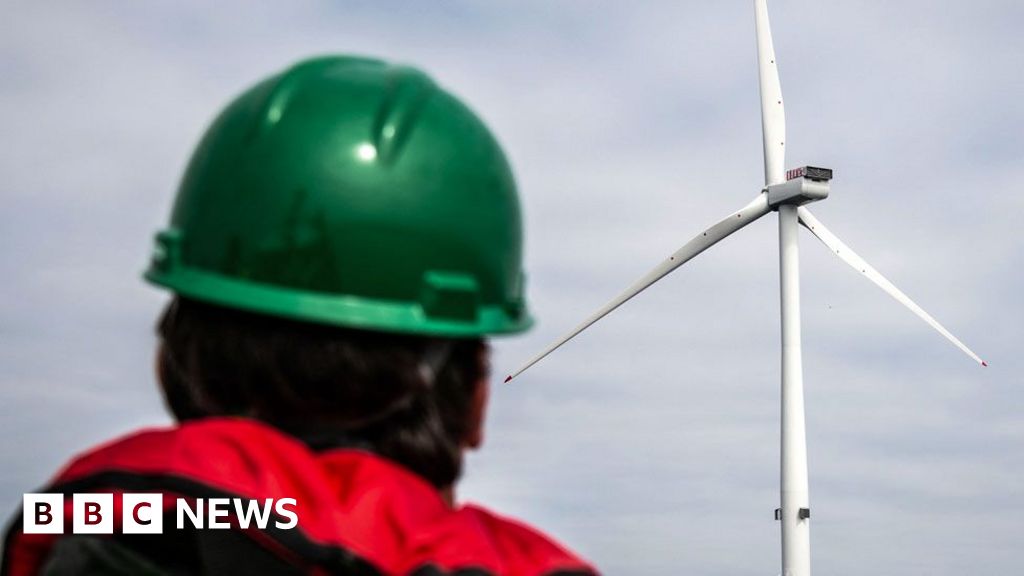 Getty Images
Getty ImagesBritish seabed owned by the Crown Estate will be used to help build windfarms in plans aimed at making the UK more self reliant for energy.
It is the first big announcement by Great British Energy, Labour’s new publicly owned energy company. The firm’s aim is increase renewable energy projects, boosted by £8.3bn in state funding, paid for by a windfall tax on oil and gas giants.
Energy Secretary Ed Miliband claimed the initiative would “lead to lower bills” for households.
But the Conservatives said GB Energy was “nothing but a gimmick that will end up costing families”.
The deal means the Crown Estate – which manages a huge portfolio of property and land and helps fund the Royal Family – will lease the land on which windfarms can be developed and built.
The Crown Estate owns the majority of the seabed which stretches up to 12 nautical miles from the mainland.
Mr Miliband claimed GB Energy would eventually lead to lower bills, but warned “it’s not going to happen overnight”.
As renewable energy projects “start coming online we’ll start to see the effect on bills. We are going as fast as we can,” he told BBC Breakfast.
The government believes it can cut the time it takes to get windfarms producing power by half. It typically takes between 10 and 15 years to build offshore windfarms.
Labour’s hope is that GB Energy, a key manifesto pledge, will reduce UK “over-reliance” on fossil fuel markets, with prices rising rapidly after Russia’s invasion of Ukraine.
This in turn pushed up the pace of general price rises, contributing to the cost-of-living crisis.
At an event to launch GB Energy on Thursday, Mr Miliband said: “A sprint for clean energy is a route to energy independence, because dictators and petrostates don’t control it.”
He added that it is “the best way to keep bills down for good”.
However, the Conservatives have said GB Energy “will end up costing families, not cutting bills”.
“It’s a financial black hole – funnelling taxpayers’ money into reducing risk for multi-million-pound energy companies,” said shadow energy secretary Claire Coutinho.
At a press conference later on Thursday, the prime minister was questioned further over whether he stood by Labour’s election campaign pledge that GB Energy would lead to energy bills falling by £300 a year per household by 2030.
Sir Keir said: “Yes I do, I stand by everything in our manifesto and one of things I made clear in the election campaign is that I wouldn’t make a single promise or commitment that I didn’t think we could deliver in government.”
The government is providing GB Energy with £8.3bn of funding but hopes to attract £60bn of private investment.
The aim is to get windfarm projects that could generate between 20GW and 30GW of offshore power to lease stage by 2030.
The Crown Estate already had this as a target, but on Thursday the government confirmed it would help.
Government officials say the involvement of the Crown Estate will accelerate the development of fixed and floating offshore wind farms, but critics say that the real bottlenecks are connecting to the power grid.
The state investment is a fraction of the £28bn a year the Labour Party originally wanted to spend on a green revolution that it hoped would decarbonise electricity generation by 2030 – a target that most experts in the energy industry consider unrealistic.
The agreement is only for projects around England and Wales, but Labour is also in discussions with the Scottish government and Crown Estate Scotland on support for local projects.
Last year, the Northern Ireland Executive and the Crown Estate agreed a statement of intent towards establishing leasing for offshore windfarms.
Northern Ireland currently has no offshore windfarms after a number of projects were abandoned at the planning stage.
The government wants GB Energy to speed up renewable energy projects by helping them develop, and invest in them alongside private investors.
It wants it to work with local energy projects and the nuclear industry.
Alongside a new law to create GB Energy, the government will also loosen regulation on the Crown Estate so it can invest and borrow more.
The government has taken a number of decisions on renewables generation since coming to power in the recent election.
It has approved three big onshore solar farm projects which have faced local opposition.

